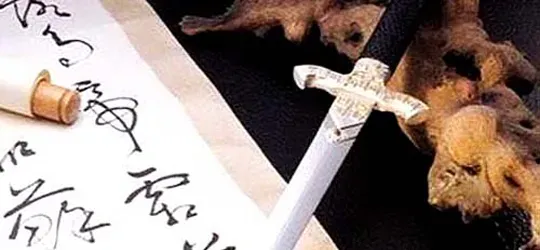List of wuxia terms
 jenxi.com
jenxi.com Vision alchemist crafting strategic innovation & AI adoption. Bridging startups to China's ecosystem advantage. Building a cyberbrain. Registered pharmacist × Brand strategist × Storyteller
This was posted when I was still using Drupal for the blog. Since data from the old blog was lost, I’ll post the list again.
Update: I’ve dived head first into wuxia translations and launched the full-fledged project at WuxiaSociety.
The list was created to propose a list of wuxia terms to be used in their original forms in translations. Due to the various Chinese dialects and styles of translating from Chinese to English, there is a myriad of terms used. This makes it confusing for both the readers and the translators.

I propose the use of wuxia terms in their original form rather than in resorting to translations to express specific terms. Perhaps with more people using the words more frequently, it would help make these terms become recognised as official English terms. That would be a bonus. However, having such a list of words would help to standardize the terms used by wuxia translators.
Many Japanese words are used in their original form in the English language. I believe this to be due to the Japanese’ staunch defense of their cultural heritage. I feel that such Chinese cultural heritage should be retained as well, especially since this terms describe very specific things.
For example, I would rather see the word katana used rather than a curved single-edged sword if I were to be reading a story set in a Japanese or related setting. There are many types of curved swords with a single edge. Which does the term a curved single-edged sword refer to? I would rather read it as katana and have to refer to a glossary (assuming that it’s the first time I come across this term), than read the other term and not have a full picture of what it means.
Using the words in their original form would also immerse the readers to the setting. It would have a stronger “flavour” to it as compared to having the term translated into English. If you share my sentiments, please do support this move and help add on to it. With this list, it would spare us the pain of having to translate terms that have very specific meaning as well as promote the use of the original forms.
I’m pretty new to the genre of wuxia and I believe I’m far below many experts out there, in terms of knowledge of these terms. If might have given an inappropriate or insufficient explanation for the terms, do let me know.
There might be a frequently used way to spell certain words which I might not be aware of. Kindly point those out too.
I have a feeling I would make lots of mistakes, so your help would be greatly appreciated.
List of existing wuxia-related terms in the English Language
Kowtow 叩头 - noun -
1. to act in an obsequious manner; show servile deference. 2. to touch the forehead to the ground while kneeling, as an act of worship, reverence, apology, etc., esp. in former Chinese custom. verb - the act of kowtowing.
Kung fu 功夫 - noun, a martial art.
Tai Chi Chuan 太极拳 - noun, a Chinese martial art and form of stylized, meditative exercise, characterized by methodically slow circular and stretching movements and positions of bodily balance.
Tong 堂 - noun, an association, society, or political party.
Qi 气 - noun, the vital force believed in Taoism and other Chinese thought to be inherent in all things. The unimpeded circulation of chi and a balance of its negative and positive forms in the body are held to be essential to good health in traditional Chinese medicine.
Wushu 武术 - noun, martial arts.
Yamen 衙门 - noun, the residence or office of a public official.
Yin and yang 阴阳 - noun, in Chinese philosophy, the two cosmic forces of creative energy, yin being feminine/negative and yang being masculine/positive, from which everything originates and depends on the interaction of the opposite and complementary principles.
Yin-yang 阴阳 - noun, a circular symbol consisting of a white and black droplet (☯), representing the fusion of the concepts yin and yang.
Proposed list of recommended wuxia terms (in addition to the list above)
Dianmai点脉 - verb, attacking the meridians to kill or incapacitate an opponent by sealing or slowing the flow of qi.
Dianxue 点穴 - verb, attacking the acupressure points to kill or incapacitate an opponent by sealing or slowing the flow of qi.
Gongli 功力 - noun, level of martial art ability or skill.
Jiang hu 江湖 - noun, the world of martial arts.
Kung fu 功夫 - noun, expertise in a skill.
Neili 内力 - noun, inner power of qi.
Qinggong 轻功 - noun, the ability to move swiftly with great agility, allowing one to leap to great heights, travel over great distance and even glide on water.
Qinna 擒拿 - verb, controlling or locking an opponent’s joints or tendons so immobilise them.
Shifu 师傅 - noun, master or teacher.
Xia 侠 - noun, a chivalrous warrior who excels in wushu and is bound to chivalrous conduct. The xia has a very strong sense of righteousness and values honour more than life. They often take justice upon their own hands.
Wugong 武功 - noun, martial arts ability.
Wulin 武林 - noun, the people of the Jiang hu.
Wuxia 武侠 - noun, the genre of chivalrous martial arts; adjective, pertaining to wuxia.
You xia 游侠 - noun, a roaming or wandering xia.
Yuan qi 元气 - noun, innate qi
Reference:
- Oxford English Dictionary
- www.dictionary.com
- www.wiktionary.com
- www.heroic-cinema.com/eric/xia.html
Note: You are encouraged to distribute it to help spread the usage of the terms. All I ask is to link back to this original list to direct others here to help us expand on the list.